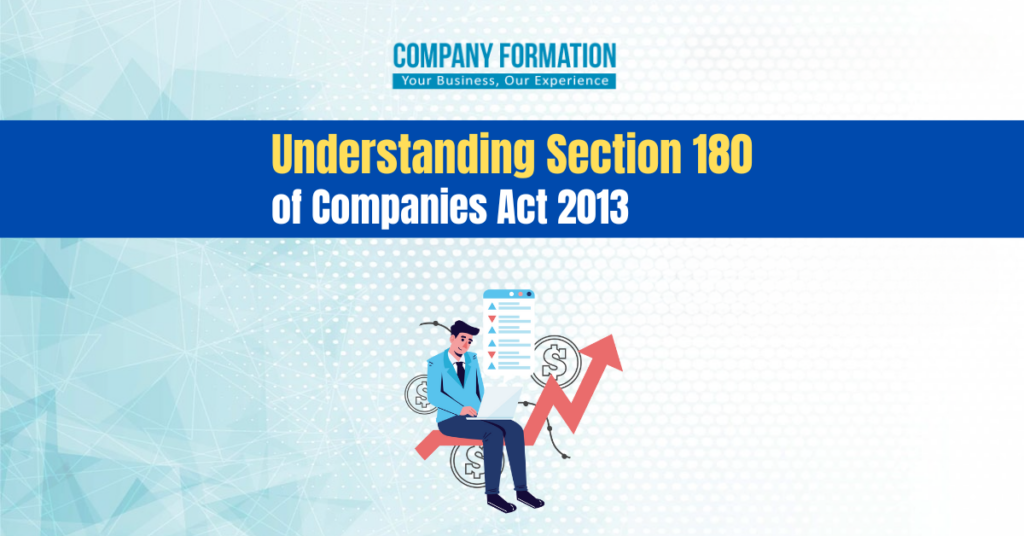Restrictions on Powers of the Board: Understanding Section 180
The Board of Directors holds significant authority in steering a company’s direction, making crucial decisions that impact its operations, finances, and future. However, this immense power comes with responsibility, and unchecked authority can pose risks to the very foundation of the company and its owners – the shareholders. The Board manages the company’s day-to-day affairs, but it’s the shareholders who ultimately own the entity. This fundamental distinction necessitates a system of checks and balances, particularly for major decisions that could fundamentally alter the company’s nature or financial standing. This is precisely where Section 180 of the Companies Act, 2013, comes into play. It acts as a critical safeguard, outlining specific restrictions on powers of the board. This post aims to demystify Section 180, clearly explaining the specific limitations it imposes, why compliance is vital for sound section 180 corporate governance Delhi and across India, and the implications of section 180 for Indian companies. Understanding this provision, a key component of section 180 company law India, is essential for directors, shareholders, and anyone involved in Indian corporate management.
What is Section 180 of the Companies Act, 2013?
The Companies Act, 2013 is the primary legislation governing the incorporation, management, and functioning of companies in India. Within this comprehensive legal framework, Section 180 stands out as a provision specifically designed to delineate the boundaries of the Board’s authority concerning certain significant actions. It mandates that the Board of Directors cannot proceed with specific major transactions unless they first obtain consent from the company’s shareholders. This isn’t just a simple majority vote; Section 180 explicitly requires a Special Resolution. The core principle underpinning this section is the protection of shareholder interests. By demanding shareholder approval for decisions that could significantly impact the company’s assets, debt levels, or structure, the Indian company act section 180 ensures that those who own the company have a decisive say in its most critical moments. It prevents the board from unilaterally undertaking actions that could dilute shareholder value or fundamentally change the business without explicit shareholder backing. For the official text, you can refer to the Companies Act, 2013 on the Ministry of Corporate Affairs website MCA Website.
Key Restrictions on Powers of the Board Under Section 180
Section 180 doesn’t impose a blanket restriction on all board activities; rather, it targets four specific types of transactions deemed significant enough to warrant shareholder intervention via a special resolution. These specific board restrictions under section 180 form the crux of the restrictions on powers of the board mandated by this law. Each restriction addresses a distinct area where board actions could have profound consequences for the company and its members. Understanding these specific clauses is crucial for ensuring compliance and maintaining good corporate governance. Let’s examine each of these restrictions in detail.
Section 180(1)(a): Selling, Leasing, or Disposing of Undertakings
This clause places a significant limitation on the board’s ability to dispose of the company’s core assets. It explicitly states that the board cannot sell, lease (otherwise than in the ordinary course of business), or otherwise dispose of the whole or substantially the whole of the undertaking of the company, or where the company owns more than one undertaking, of the whole or substantially the whole of any such undertakings, without first obtaining shareholder approval through a special resolution. An “undertaking” essentially refers to the operational unit or the business activity that constitutes the company’s primary function or a significant part thereof; it represents the assets and activities through which the company generates income. The Act clarifies “substantially the whole of the undertaking” with a defined threshold: it means 20% or more of the company’s net worth as per the audited balance sheet of the preceding financial year, OR an undertaking which generates 20% or more of the total income of the company during the previous financial year. The implications of section 180 for Indian companies under this clause are substantial, preventing the board from unilaterally selling off major business divisions or critical assets without shareholder consent, thereby protecting the fundamental nature of the enterprise.
Section 180(1)(b): Investing Compensation from Mergers/Amalgamations
Mergers and amalgamations often involve complex financial settlements, including compensation received by the company. Section 180(1)(b) restricts the board’s power regarding the investment of such funds. It states that the board cannot invest, otherwise than in trust securities, the amount of compensation received by it as a result of any merger or amalgamation without a special resolution passed by the shareholders. Trust securities are generally considered safe, low-risk investments. The rationale behind this restriction is to safeguard the compensation funds, ensuring they are not deployed into potentially speculative or high-risk ventures without the explicit agreement of the shareholders. It prevents the board from unilaterally deciding the fate of funds received in potentially transformative events like mergers, ensuring shareholder oversight on how these proceeds are utilized, preserving capital unless shareholders agree to a different investment strategy. This provision reinforces the principle that funds arising from significant corporate restructuring events require careful handling and shareholder approval for non-standard investments.
Section 180(1)(c): Borrowing Powers
Managing debt is a critical function of the board, but excessive borrowing can expose a company to significant financial risk. Section 180(1)(c) addresses this by capping the board’s borrowing authority without shareholder approval. The restriction applies when the money proposed to be borrowed, together with the money already borrowed by the company (apart from temporary loans obtained from the company’s bankers in the ordinary course of business), will exceed the aggregate of its paid-up share capital, free reserves, and securities premium. If the total borrowings exceed this threshold, the board must obtain a special resolution from the shareholders before taking on further debt. It’s crucial to understand the definition of “temporary loans” which are excluded from this calculation: these are loans repayable on demand or within six months from the date of the loan, such as short-term cash credit arrangements, bill discounting facilities, etc., provided by the company’s bankers as part of regular business operations. This aspect significantly impacts board powers limitations Mumbai and other financial centres, ensuring that substantial increases in leverage, which could heighten financial risk, receive shareholder scrutiny and approval.
Section 180(1)(d): Remitting or Giving Time for Debt Repayment by a Director
Conflicts of interest involving directors are a key concern in corporate governance. Section 180(1)(d) directly addresses one such potential conflict. It restricts the board’s power to remit, or give time for the repayment of, any debt due from a director of the company without a special resolution from the shareholders. This means the board cannot unilaterally decide to forgive a loan given to a director or extend the repayment period significantly without shareholder consent. The rationale is clear: it prevents the board from potentially showing undue favouritism towards one of its own members at the expense of the company and its shareholders. This provision acts as a crucial check to ensure that any concessions regarding debts owed by directors are transparently presented to and approved by the shareholders, upholding fairness and accountability within the company’s leadership structure. It reinforces the principle that directors should be held to strict standards regarding their financial obligations to the company.
Why are These Board Restrictions Important? Understanding Section 180’s Purpose
The specific limitations outlined in Section 180 are not arbitrary; they serve several fundamental purposes crucial for healthy corporate functioning and stakeholder confidence. Primarily, Section 180 acts as a powerful mechanism for shareholder protection. By reserving critical decisions—those involving substantial assets, major investments, significant borrowing, or director debts—for shareholder approval via a special resolution, the law ensures that the ultimate owners of the company have a direct say in matters that could fundamentally alter their investment’s value or risk profile. This empowerment is central to the concept of shareholder democracy.
Furthermore, these restrictions on powers of the board play a vital role in promoting robust corporate governance. Adherence to Section 180 fosters transparency and accountability, as the board must justify major proposed actions to the shareholders and secure their explicit consent. This process enhances stakeholder confidence, assuring investors, creditors, and the public that significant decisions are made with due diligence and oversight. Proper section 180 corporate governance Delhi, Mumbai, Bangalore, and across India is thus significantly strengthened by this provision. It also acts as a crucial check against potential mismanagement or arbitrary decision-making by the board. Requiring a supermajority (75%) shareholder approval makes it significantly harder for a board to push through potentially detrimental or self-serving proposals without broad consensus among the owners. Ultimately, Section 180 strikes a critical balance of power. It acknowledges the board’s need for authority in managing daily operations while ensuring that shareholders retain control over defining strategic shifts and decisions with long-term, high-impact consequences.
Consequences of Non-Compliance with Section 180
Ignoring the mandates of Section 180 is not merely a procedural lapse; it carries significant legal and financial consequences, underscoring the importance of strict section 180 compliance India. The primary ramification concerns the validity of the transaction itself. Any transaction undertaken by the board that falls under the purview of Section 180 but is executed without the requisite special resolution from shareholders is potentially voidable at the option of the company or its shareholders. This means the transaction could be legally challenged and potentially unwound. However, Section 180(5) offers some protection to third parties; if a person deals with the company in good faith and without knowledge that the board exceeded its powers (i.e., lacked the special resolution), the transaction might still be binding on the company, particularly concerning the acquisition or disposal of property or assets.
Beyond the transaction’s validity, directors who authorize such non-compliant actions may face personal liability. They could be held accountable for any losses incurred by the company due to the unauthorized transaction, potentially facing legal action from shareholders seeking damages. Failure to adhere to section 180 guidelines Bangalore or any other location can also lead to reputational damage, eroding trust among investors, lenders, and the market. Therefore, meticulous adherence to Section 180 procedures is paramount to avoid legal disputes, financial penalties, director liabilities, and maintaining the company’s standing. It’s a cornerstone of responsible corporate conduct in India.
For those looking to establish a new business structure and comply with all necessary legal frameworks, it’s essential to start with Company Registration in India, ensuring a strong foundational understanding of your business obligations and opportunities.
Applicability and Exceptions to Section 180
It is crucial to understand which types of companies are bound by the restrictions outlined in Section 180. The provisions of this section primarily apply to Public Companies. These are companies that can offer their shares or debentures to the public and typically have a larger shareholder base and stricter regulatory oversight.
Conversely, Private Companies are generally exempt from the requirements of Section 180. This exemption recognizes the typically closer relationship between management and shareholders in private companies and aims to provide them with greater operational flexibility. However, this exemption is not absolute. A Private Company’s Articles of Association (AoA)—the company’s internal rulebook—can voluntarily incorporate provisions similar to or even stricter than those in Section 180. Therefore, directors and shareholders of private companies should always review their AoA carefully to understand any self-imposed restrictions on board powers. Even if not legally mandated, adhering to the principles of Section 180 can be considered a best practice for good corporate governance in private companies as well.
Understanding different Comparing Business Structures: Private Limited, LLP, OPC & More can further illuminate how structure-specific governance and compliance issues might influence business effectiveness and compliance obligations.
Furthermore, there are specific exceptions built into the section itself. As previously mentioned, the borrowing power restriction under Section 180(1)(c) explicitly excludes temporary loans obtained from the company’s bankers in the ordinary course of business. Additionally, for companies whose ordinary business involves selling or leasing property (e.g., real estate companies, leasing firms), the restriction under Section 180(1)(a) regarding the sale or lease of undertakings may not apply to transactions conducted as part of their normal business operations. Understanding this applicability scope is vital for correct implementation.
For assistance in refining compliance frameworks and advancing tax strategies, our comprehensive TAXATION SERVICES IN INDIA can provide tailored support to guide businesses effectively through complex financial landscapes.
Conclusion
In essence, Section 180 of the Companies Act, 2013, serves as a vital legislative checkpoint, imposing crucial restrictions on powers of the board concerning four specific categories of major corporate actions: selling or leasing substantial undertakings, investing merger compensation outside trust securities, borrowing beyond specified limits, and forgiving director debts. The core purpose is unequivocally shareholder protection, ensuring that the company’s owners have the final say, through a special resolution, on decisions that could significantly alter the company’s financial health or strategic direction.
The key takeaway for directors and shareholders, particularly in public companies across India, is the non-negotiable requirement for this shareholder approval before embarking on any transaction covered by Section 180. For anyone involved in corporate management, understanding section 180 in Chennai, Mumbai, Delhi, Bangalore, or anywhere else in India is not just about legal compliance; it’s fundamental to good corporate governance, maintaining stakeholder trust, and safeguarding the company’s long-term interests.
Navigating the complexities of the Companies Act, including Section 180 compliance, shareholder meetings, and overall corporate governance, can be challenging. If your business needs assistance with section 180 compliance India, requires expert guidance on corporate secretarial matters, or needs support with company registration, GST compliance, or accounting, contact TaxRobo today. Our team of experts is here to provide clear, reliable, and actionable advice tailored to your business needs. Let us help you ensure compliance and foster good governance. Visit our TaxRobo Company Law Services page to learn more.
Frequently Asked Questions (FAQs)
What exactly is a “Special Resolution” under the Companies Act, 2013?
A special resolution, as defined under the Companies Act, 2013, is a resolution that requires a higher majority for approval compared to an ordinary resolution. To be passed, it must be approved by votes cast in favour (whether in person, by proxy, or by postal ballot) being not less than three times the number of votes cast against it. Essentially, it requires the support of at least 75% of the shareholders who are entitled to vote and are present and voting at the meeting. Crucially, the notice calling the general meeting must explicitly state the intention to propose the resolution as a special resolution.
Does Section 180 apply to all Private Limited Companies in India?
Generally, no. Section 180 of the Companies Act, 2013 primarily applies to public companies. Private limited companies are explicitly exempted from its provisions by notifications issued by the Ministry of Corporate Affairs (MCA), subject to certain conditions (like not having defaulted in filing financial statements or annual returns). However, it’s important for private companies to check their Articles of Association (AoA), as they might voluntarily include similar restrictions on the board’s powers. Even without a legal mandate, adopting such practices can be beneficial for promoting transparency and good corporate governance within a private company.
How is “substantially the whole of the undertaking” defined for Section 180(1)(a)?
The Companies Act, 2013 provides a clear quantitative definition in the Explanation to Section 180. “Substantially the whole of the undertaking” in any financial year means 20% or more of the value of the undertaking based on the audited balance sheet of the preceding financial year OR an undertaking which generates 20% or more of the total income of the company during the previous financial year. If a proposed sale, lease, or disposal meets or exceeds either of these thresholds for an undertaking, it triggers the requirement for a special resolution under Section 180(1)(a).
Are bank overdrafts or cash credits considered “borrowings” restricted under Section 180(1)(c)?
Section 180(1)(c) restricts total borrowings (excluding temporary loans) to the aggregate of paid-up share capital, free reserves, and securities premium, unless approved by a special resolution. The section specifically excludes “temporary loans” obtained from the company’s bankers in the ordinary course of business when calculating this borrowing limit. “Temporary loans” are defined as loans repayable on demand or within six months from the date of the loan, such as short-term, cash credit arrangements, bill discounting facilities, etc. Therefore, typical bank overdrafts or cash credit facilities used for working capital needs and fitting this definition are generally not counted towards the borrowing limit that triggers the need for a special resolution under Section 180(1)(c).
Where can I find the official wording of Section 180?
The official and most accurate text of Section 180 can be found directly in the Companies Act, 2013. You can access the updated version of the Act, including all amendments, on the official website of the Ministry of Corporate Affairs (MCA), Government of India: https://www.mca.gov.in/MinistryV2/companiesact.html. Reliable legal databases and publications also provide the text of the Act. It’s always advisable to refer to the official source for precise legal language and interpretation.




Does bank guarantee or letter of credit(typically non-funded loans) falls under section 180(1)(c)?
Does non funded loans like bank guarantee or letter of credit falls under section 180(1)(c)?